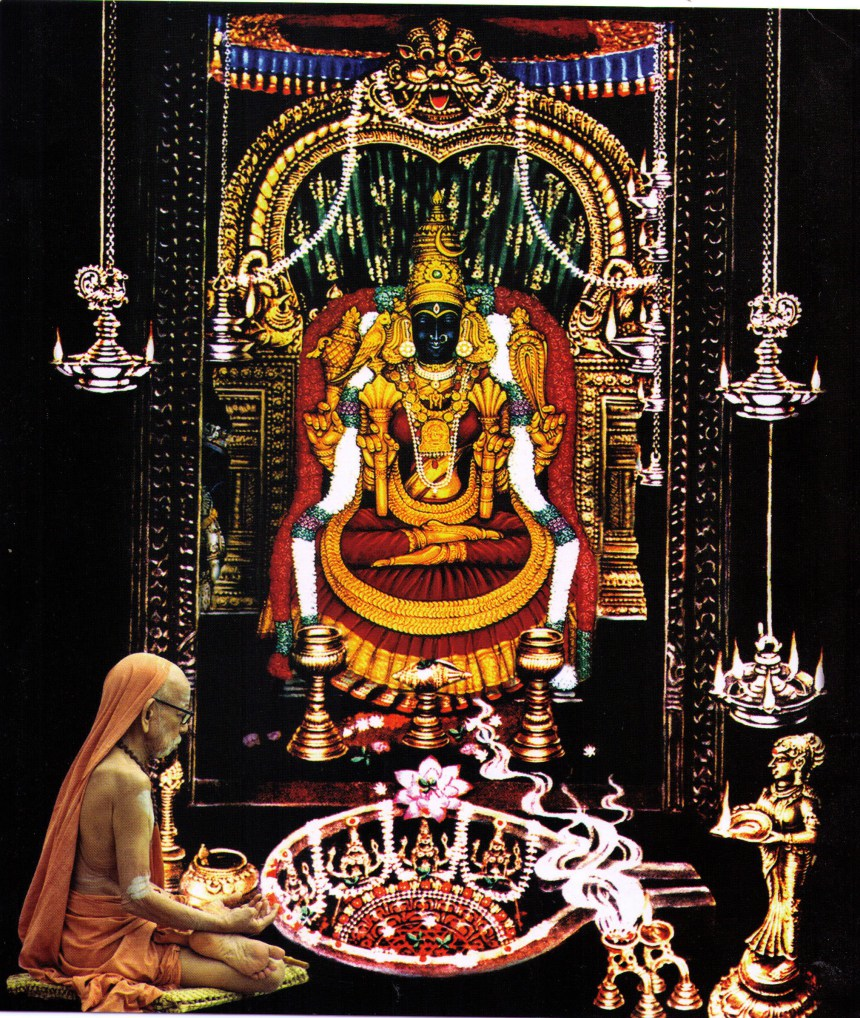If any purpose has been served by listening to me all the while, it is up to you [Brahmins] to take whatever steps you think fit to promote Vedic learning. Every day you must perform " Brahmayajna" which is one of the five great sacrifices( mahayajnas). The term "Brahma" in " Brahmayajna" means the Vedas. The power of the mantras must be preserved in us as an eternal reality. It must burn bright like a lamp that is never extinguished. For this reason it is that we perform Brahmayajna. We must offer oblations to the presiding rsi or seer of our Vedic recension. Failing that, the least we can do is perform the Gayatri- japa every day. Gayatri is the essence of the Vedas, their substance. To qualify to chant it, you must be initiated into it by a Guru. The Gayatri you thus learn must be mentally repeated at least a thousand times every day. Again, the least you can do - and you must do it- is to chant the mantra atleast ten times morning, noon and dusk. The sun god is the presiding deity of Gayatri. Sunday, the day of the sun, is a universal holiday. On this day you must get up at 4 in the morning and, after your ablutions, recite the Gayatri a thousand times. This will ensure your well-being as well as of all mankind.
All Brahmins must learn to chant the Purusasukta, the Srisukta, Sri Rudram, etc. I am speaking particularly to office going Brahmins here. Since they will find it difficult to devote themselves fully to Vedic learning they must try to acquire at least a minimum of scriptural knowledge. But it should be creditable if they accomplish something- in the present case learning the Vedas- in the face of difficulties. If you start learning the scripture now you will be able to complete your study in a few years. But you need faith and devotion. The Vedas are a vidya that has come down to us through the millennia. If you study them with determination you are bound to succeed. Haven' t you seen 50- and 60- year- old people engaged in research in the hope of gaining a Ph. D. or some other degree? If you have the will you will have the way to accomplish anything however difficult. There are examples of individuals who at 40 had been totally in the dark about the Vedas but who later learned to chant them with ardour. As a matter of fact there are such men among the office- bearers of our Veda Raksana Nidhi Trust. So what is needed is faith as well as resoluteness.
Leave aside the question of Brahmins who are in jobs and are middle- aged or older. Whether or not they themselves can chant the Vedas or want to learn to chant them, they must see to it that their sons at least receive instruction in the scriptures. Perhaps the children cannot be sent for a full-time course in the Vedas, but the parents could at least ensure that, after they perform the upanayana of their sons at the age of eight years, the boys are taught the Vedas for one hour every evening for a period of eight years. A Vedic tutor may be engaged on a cooperative basis for all children of a locality or village. This should be of help to the children of poor Brahmins.
Above all, efforts must be made to ensure that the existing Vedic schools that are in bad shape are not forced to close down. These institutions must be reinvigorated and more and more students encouraged to join them. To accomplish this task both teachers and taught must be adequately helped with money.
Let me repeat that Brahmins ought not to be afforded more than the minimum cash or creature comforts. But we see today that there are many lucrative jobs to tempt them. So there is the danger of their not being fully involved in their svadharma (own duty) of learning and teaching the Vedas if they are not kept above their want. We must provide them with certain facilities so that we are not faced with the unfortunate situation in which such Brahmins become more and more scarce. There are new comforts, new avenues of pleasure, not known in the past. It is unrealistic to expect a few Brahmins alone to deny themselves all these and adhere to their svadharma. If we adopt such an attitude the Vedic dharma will suffer. So when some Brahmins are engaged exclusively in their dharma it is obligatory on our part to help them with money and material. Though they must not be afforded any luxuries, we must provide them with enough comforts so that they are not enticed into other jobs. We have drawn up a number of schemes bearing this in mind.

